 With the discussion of COVID-19 Stage 3 re-openings in Ontario and the related timelines, I decided to look through the list of businesses and services myself, to see what York Region might be able to expect in the coming weeks. And for those people who feel ready to participate in these re-openings, there’s a wide range of businesses for us to start patronizing again. But there is one significant hobby that is necessarily being left out by the closures… and probably for a long time. It’s the music fans! Some of the few remaining restrictions present in Phase 3 include “dancing at restaurants and bars” and “private karaoke rooms”. Concerts and live shows have gathering limits, and large outdoor events such as concerts are not permitted. And when you think about what these kinds of events entail, it makes complete sense that they won’t be permitted just yet. Some of my absolute favourite music-related memories are a complete nightmare in the COVID-19 age.
With the discussion of COVID-19 Stage 3 re-openings in Ontario and the related timelines, I decided to look through the list of businesses and services myself, to see what York Region might be able to expect in the coming weeks. And for those people who feel ready to participate in these re-openings, there’s a wide range of businesses for us to start patronizing again. But there is one significant hobby that is necessarily being left out by the closures… and probably for a long time. It’s the music fans! Some of the few remaining restrictions present in Phase 3 include “dancing at restaurants and bars” and “private karaoke rooms”. Concerts and live shows have gathering limits, and large outdoor events such as concerts are not permitted. And when you think about what these kinds of events entail, it makes complete sense that they won’t be permitted just yet. Some of my absolute favourite music-related memories are a complete nightmare in the COVID-19 age.
Music appreciation, music enjoyment, is such a communal experience. When you’re at a concert – the reverent hush of the crowd while the band plays a deep cut b-side it. Or the intensifying buzz and cheers as the crowd begins to recognize the opening chords of a hit single. It’s magic and there’s nothing like it. And for those of you who may disagree with my inclusion of “private karaoke rooms” in a live music appreciation post – there’s no greater compliment than choosing a song for karaoke! Pick a song that you’ve listened to a song so many times that you know the lyrics by heart, and then choose to share that love with your friends (or strangers). When you plan a karaoke evening with friends, you know it’s going to be about celebrating your favourite songs, or guilty pleasures, looking to impress your friends with your next song pick.
But, like I said, thinking about those experiences now… it’s hard to predict when we’re ever going to be able to sing into the same microphone as friends. Or be crowded into a small concert venue, shoulder to shoulder with strangers. I’m not going to pretend to suggest that there are books that will replace those feelings. Reading is, by its nature, a solitary pursuit. You can discuss with friends and strangers what you thought about a book and your interpretation of it. You can participate in book clubs or Canada Reads and revel in the experience that someone else had while reading an excellent book… but that’s not the same as attending a live concert with someone else. Or sharing a pair of headphones with your best friend, listening to your favourite band’s newest single. But instead, we can use this time to read books that celebrate music, music fans, and the effect it has on our lives. I’m trying not to include memoirs of musicians in this list – that should be its own list entirely! This is a list of books that replicate the life of a musician or a music lover. Books that tell you more about what music stands for, and what its power is.
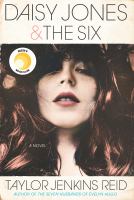
Daisy Jones and the Six by Taylor Jenkins Reid
Daisy Jones and the Six is a fictional oral history of one of the biggest bands in the 1970s. The oral history format allows each musician/character to have their own say about how their personal life affected the music they made, and vice versa. The author writes about being inspired by Fleetwood Mac and the story behind Rumours – and this influence is absolutely apparent. What Taylor Jenkins Reid brings to the story is the emotional labour that goes into creating music. And, of course, a behind the scenes look at the drama, the drugs, the record executives – the unsavory aspects of creating your favourite songs.
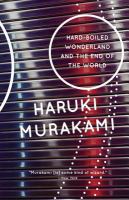 Hard-Boiled Wonderland and the End of the World by Haruki Murakami
Hard-Boiled Wonderland and the End of the World by Haruki Murakami
To be clear, Hard-Boiled Wonderland and the End of the World isn’t really about music, at all. It’s one of Murakami’s earliest novels, having been written in the mid 1980s, but it has all the hallmarks of my favourite Murakami novels – cats, magical realism, a loner protagonist who gets caught up in some kind of conspiracy, and jazz music. What struck me about this book, one of the things that’s stuck with me years after I read it, was the way that Murakami talks about the protagonist going about his day, carefully selecting records (or, often, cassette tapes) that he puts on to set the mood, as he sits and quietly listens. There’s so much care put into these descriptions and passages about music that you can tell it’s an important aspect to Murakami himself. It comes as no surprise, then that Murakami once owned a jazz club in Tokyo – or, perhaps, that the novel itself inspired a jazz album.
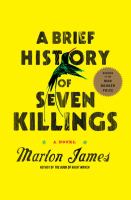 A Brief History of Seven Killings by Marlon James
A Brief History of Seven Killings by Marlon James
In 1976, just before Bob Marley was to play the Smile Jamaica Concert, there was an attempt on his life. While he played the concert just two days later, he would then leave the country, not to return for several years. In A Brief History of Seven Killings, Marlon James writes an epic novel about Jamaica in the 1970s and 1980s, starting with the attempted assassination of Bob Marley, and filling in the gaps of what we don’t know about that event (like who did it, for example), and leading to its effects on the country and its people. Each of the five sections of this novel are named after a musical track, underscoring the importance that music has on history and politics.
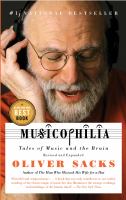 Musicophilia by Oliver Sacks
Musicophilia by Oliver Sacks
Can you imagine what it would be like to not be able to listen to music? Or rather, to hear and feel nothing while you listen to music? In Musicophilia, the famed neurologist Oliver Sacks writes about cases of people who are “musically misaligned” – and thus, exploring the way the brain affects how we hear music. From the big examples, like people with “amusia”, for whom music just sounds like a clattering of noise, to how songs get stuck in your head, Sacks covers everything you’d want to know about the perception of music.
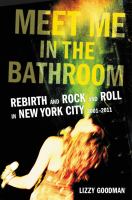 Meet Me in the Bathroom: Rebirth and Rock and Roll in New York City, 2001-2011 by Lizzy Goodman
Meet Me in the Bathroom: Rebirth and Rock and Roll in New York City, 2001-2011 by Lizzy Goodman
You can insert in here any oral history of music scenes – I’m choosing to include Meet Me in the Bathroom because of its personal interest to me. The early 2000s was a time that has forever shaped the music scene in many ways – specifically, the democratization of music distribution by Napster, which almost killed the music industry, and led to the music platforms that we have today. It also led to a new rock music scene based in NYC, with bands like The Strokes, Yeah Yeah Yeahs, and LCD Soundsystem leading the way. For other oral histories of music scenes that the library has in its collection, check out Please Kill Me: The Uncensored Oral History of Punk or Our Band Could Be Your Life: Scenes from the American Indie Underground, 1981-1991.
Do you have any other music novels that you’d like to share? Want to commiserate on all the concerts you’re missing this year, or share some music that’s rescued your quarantine? Sound off in the comments!
I was supposed to see Matthew Good on March 14. The concert has been rescheduled for November, but since it’s at a bar I doubt that’s going to happen. He did a live acoustic concert from home last Friday on Zoom, with a fan Q&A. It was $20 a ticket and sold out. I didn’t attend but my sister did and she enjoyed it. Maybe we’ll see more artists doing this going forward as a way to stay connected to fans and make a little money.
Oh wow, right at the beginning of the pandemic!! That was the day everything closed, right? And we thought we’d be able to go to concerts in a month or two? I haven’t attended any virtual concerts yet but you’re right, that’s a great way to support our favourite artists 🙂